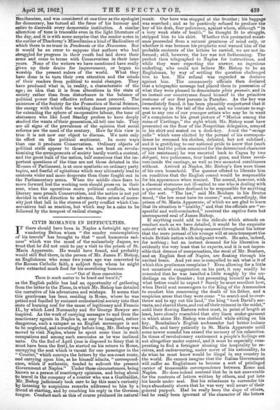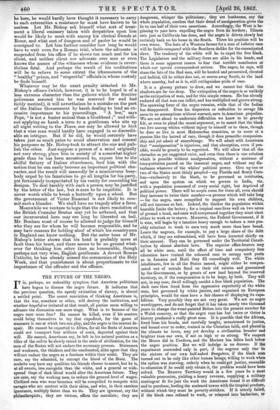CIVIS ROMANI'S IN DIFFICULTIES.
IT there should have been in Naples a fortnight ago any wandering Briton whom "the sundry contemplation of his travels" has brought to that "most humorous sad- ness" which was the mood of the melancholy /agues, we trust that he did not omit to pay a visit to the prison of St. 7:traria Apparente. He would have found, and probably would still find there, in the person of Mr. James F. Bishop, an Englishman who some two years ago was converted to the Roman Catholic faith, a subject from whom he might have extracted much food for his moralizing humour.
—" Out of these convertites There is much matter to be heard and leam'd;" as the English public has had an. opportunity of gathering from the letter to the Times, in which Mr. Bishop has detailed the narrative of his adventures and mishaps. It seems that this gentleman has been residing in. Rome, where he was petted and fondled by eminent ecclesiastical society into that state of burning zeal for the cause of legitimacy and Francis IL, by which Lord Normanby and Sir George Bowyer are inspired. As the work of carrying messages to and from the reactionary agents in Naples is, as may be imagined, rather dangerous, such a catspaw as an English messenger is not to be neglected, and accordingly before long, Mr. Bishop was moved to visit Naples, where he spent some time in such occupations and amonc, such associates as he was inclined unto. On the 2nd of April (one is disposed to fancy that it must have been the first), he started on his return to Rome, occupying the seat which is vacant for one passenger in the "Courier," which conveys the letters by the sea-coast route, and carrying upon him, as he himself admits, " correspond- ence, which if authentic, tended to subvert the present Government at Naples." Under their circumstances, being known as a person of reactionary opinions, and being about to travel in the company of a courier who was a Garibaldist, Mr. Bishop judiciously took care to lay this man's curiosity by listening to suspicious remarks addressed to him by a friend at starting, and by couching his reply in the German tongue. Conduct such as this of course produced its natural result. Our hero was stopped at the frontier ; his baggage was searched ; and as he positively refused to produce the key of his desk, four policemen, against whom, although " in a very weak state of health," he thought fit to struggle, stripped him to his shirt. Whether this protracted resist- ance proceeded from a natural greatness of mind only, or whether it was because his prophetic soul warned him of the probable contents of the letters he carried, we are not in- formed; still, however, the key was not forthcoming. The prefect then telegraphed to Naples for instructions, and while they were expecting the answer, an ingenious underling, who could not believe Mr. Bishop to be an Englishman, by way of settling the question challenged him to box. His refusal was regarded as decisive against him. The unmannerly officials then declared that a telegraphic message had placed them in possession of what they were pleased to denominate plein pouvoir, and in an instant our countryman found himself in the primitive costume of our first parents in Paradise. As the key was immediately found, it has been plausibly conjectured that it was sewn up in the tail of the shirt, and we venture to sug- gest to any one of our younger artists who may be in want of a companion to his great picture of "Marius among the ruins of Carthage," the sight which Mr. Bishop must have presented on the floor of the Neapolitan delegation, arrayed in his shirt and seated on a desk-key. Amid the "savage yells" which were elicited by the perusal of his correspon- dence he resumed his clothes, defeated, but not subdued ; and it is gratifying to our national pride to know that (such respect had the police conceived for the determined character of his resistance) he was escorted back to Capua by two delegati, two policemen, four loaded guns, and three revol- vers inside the carriage, as well as two mounted carabineers without. Arrived at Naples, Mr. Bishop's foes were those of his awn household. The (Nestor offered to liberate him on condition that the English consul would be responsible for his appearance when wanted. The consul, however, with a classical sternness not ill-suited to one who is dealing with a questor, altogether declined to be responsible for anything of the sort. "The law," said Mr. Bonham in his Brutus mood, "the law must have its course ;" and, accordingly, the prison of St. Maria Apparente, of which we are glad to learn that its situation is "healthy," and that the officials are "re- spectful and well-conducted," received the captive form but unconquered soul of James Bishop. If anything could add to the ridicule which attends on conduct such as we have detailed, it would be the exquisite naivete with which Mr. Bishop assumes throughout his letter that the mere perusal of his wrongs will at once transport the whole British nation with indignant wrath. He asks, indeed, for nothing ; but an instant demand for his liberation is evidently the very least that he expects, and it is not impos- sible that dreams of compensation, the recal of Mr. Bonham, and an English fleet off Naples, are floating through his excited brain. And yet one is compelled to ask what is it of which this gentleman complains ? Even allowing for a little not unnatural exaggeration on his part, it may readily be conceded that he was handled a little roughly by the un- derlings on the frontier ; but presenting himself as he did, what better could he expect ? Surely he must recollect how-, when David sent messengers to the Sing of the Ammonites. to comfort him concerning the death of his flither, and a suspicion arose that they, were come "to search and to over- throw and to spy out the land," the king "took David's ser- vants, and shaved them, and cut off their raiment in the midst," until their flowing Eastern robes must, in point of length at least, have closely resembled that airy linen under-garment in. which alone Mr. Bishop was clothed while sitting on bin key. Bombalino's English ambassador had better imitate David's, and tarry patiently in St. Maria Apparente until some newer scandal has erased the memory of his calamities. In times of revolutionary excitement a people's feelings are not altogether under control, and it must be especially exas- perating to find a foreigner abusing the hospitality he re- ceives, and endeavouring, under cover of his nationality, to do what he must know would be illegal in any country in the world. He cannot imagine that the Italian Government will suffer an Englishman to become a sort of privileged carrier of treasonable correspondence between Rome and Naples. He does indeed contend that he is not answerable for the contents of letters written by others, and put into, his hands under seaL But his reluctance to surrender lus keys abundantly shows that he was very well aware of their. general purport. Had he really been the dupe of others, had he really been ignorant of the character of the letters he bore, he would hardly have thought it necessary to carry to such extremities a resistance he must have known to be useless. Let Mr. Bishop ask himself what sort of treat- ment a liberal emissary taken with despatehes upon him would be likely to meet with among his clerical friends at Rome, and what sort of dungeon and of gaoler he would be consigned to. Let him further consider how long he would have to wait even for a Roman trial, where the advocate is suspended from his office if he shows too much zeal for his client, and neither client nor advocate ever sees or even knows the names of the witnesses whose evidence is never- theless fatal. And perhaps the result of his meditations will be to relieve to some extent the irksomeness of the "healthy" prison, and "respectful" officials in whose custody he finds himself.
Whatever may be the exact penalty attached to Mr. Bishop's offence (which, however, it is to be hoped is of a less extreme character than the gallows which the frontier policeman assured him he was reserved for and had richly merited), it will nevertheless be a mistake on the part of the Italian Government by harsh dealing to lend an ex- cessive importance to his proceedings. "A bee," says Pope, "is not a busier animal than a blockhead ;" and with- out applying so harsh a term to a gentleman who sits up all night writing to the Times, one may be allowed to hint that a wise man would hardly have engaged in so discredit- able an intrigue. But if he did, he would certainly have taken just as much pains to avoid observation and conceal his purposes as Mr. Bishop took to attract the one and pub- lish the other. Just suppose a person of a mind originally not very strong, place him in society of a somewhat higher grade than he has been accustomed to, expose him to the skilful flattery of Italian churchmen, feed him with the notion that he can easily become an important political cha- racter, and the result will assuredly be a mischievous busy- body urged by his fanaticism to go all lengths for his party, yet fortunately incapacitated by his vanity for concealing his designs. To deal harshly with such a person may be justified by the letter of the law, but is sure to be impolitic. It is never worth while to break a butterfly upon a wheel. But the government of Victor Emanuel is not likely to com- mit such a blunder. We shall have no tragedy after a farce. Meanwhile we venture to hope that the stern resolution of the British Consular Brutus may yet be softened, and that our incarcerated hero may ere long be liberated on bail. Mr. Bonham must of course be allowed to judge for himself who they are for whom he will become responsible, and he may have reasons for holding aloof of which his countrymen in England can know nothing. But the naive tone of Mr. Bishop's letter shows that his head is probably more at fault than his heart, and there seems to be no ground what- ever for thinking him other than an honourable, though perhaps not very wise, English gentleman. A devout Roman Catholic, he has already missed the ceremonies of the Holy Week, and that punishment is about proportionate to the importance of the offender and the offence.































 Previous page
Previous page